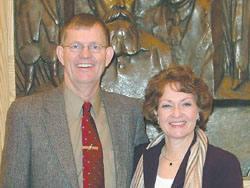2006.08.06: August 6, 2006: Headlines: COS - Ukraine: Married Couples: Older Volunteers: Idaho State Journal: Peace Corps Volunteers Diane and Dave Phelps write their their training assignment in Bila Tserkva
Peace Corps Online:
Directory:
Ukraine:
Peace Corps Ukraine :
The Peace Corps in the Ukraine:
2006.08.06: August 6, 2006: Headlines: COS - Ukraine: Married Couples: Older Volunteers: Idaho State Journal: Diane and Dave Phelps write about how they decided to join the Peace Corps :
2006.08.06: August 6, 2006: Headlines: COS - Ukraine: Married Couples: Older Volunteers: Idaho State Journal: Peace Corps Volunteers Diane and Dave Phelps write their training in the Ukraine :
2006.08.06: August 6, 2006: Headlines: COS - Ukraine: Married Couples: Older Volunteers: Idaho State Journal: Peace Corps Volunteers Diane and Dave Phelps write their their training assignment in Bila Tserkva
Peace Corps Volunteers Diane and Dave Phelps write their their training assignment in Bila Tserkva

"Language training consisted of four to six hours a day of language classes, five days a week. Interspersed with that training, and on every Saturday, we received cross-cultural and technical training. Peace Corps is very interested in volunteers fitting well into the local society and both language and cross-cultural training aid in this integration. During training we also taught at local schools so that we could learn how Ukrainian schools operate and to help us fit in at our final site. This period was an extremely stressful one for us."
Peace Corps Volunteers Diane and Dave Phelps write their their training assignment in Bila Tserkva
Pocatellans head to Ukraine on Peace Corp Mission
Narrative by Dave Phelps
[Excerpt]
On December 25, 2005, Diane and I left for Bila Tserkva, which is to be our home for our two years service in Ukraine. As a side note, Ukrainians actually celebrate Christmas on January 7, not on December 25 as in America, thus traveling on December 25 was travel as usual for Ukrainians (and Peace Corps Volunteers in Ukraine).
Bila Tserkva was founded in 1032 A.D. and is called Bila Tserkva because a white church was originally built on the bank of the Ross River, which flows through this city. Bila Tserkva has a population between 200,000 and 250,000, depending upon who you ask. Bila in Russian means “white” and Tserkva in Russian means “church”. Thus the name Bila Tserkva is White Church. There is a church building here that represents that original white church. It has a large pipe organ in it and concerts are routinely held there. There is a museum here that has a great number of historical documents and items that date back centuries in Bila Tserkva's history.
Bila Tserkva has one of Ukraine's most well known and prettiest parks, Alexandria Park. Many people go there with their family. This huge park includes ponds, lakes, waterfalls and a small canyon. They are quite a few different varieties of trees and birds that inhabit the park.
The weather in Bila Tserkva very much mirrors the weather in Pocatello, both in temperature and snow. Bila Tserkva is located further north on the globe than Pocatello, so the days in the winter are about an hour shorter. It so happens that this winter turned out to be the coldest winter in Ukraine in over 40 years. The tragedy was that over 1000 people died because of the cold this winter, many others lost fingers and toes. The news programs during the winter chronicled the impact of the cold. Bila Tserkva reached -30 C this winter and school was closed for three days. In Luhansk, a city located in the eastern part of the country near the Russian border, the temperature reached -40 C. Many people were without heat during the coldest spell due to the freezing of the heating systems used by cities.
On the day before the schools closed here in Bila Tserkva, it was -30 C and had a wind of around 20 mph. That calculates to -45 F. People still walked to work and the markets, and I walked to school, Diane was off that day so did not have to walk in the cold. We all bundled up with heavy coats and woolen sweaters, which kept us from freezing. The transport system failed in many places because the fuel froze. In Bila Tserkva, as with most other Ukrainian cities, there are no school busses. Children have to use public transportation or walk to school. Such harsh weather in an area where people have to walk to survive makes life very difficult. The Ukrainian people are able to survive and live in such circumstances.
In January, the disagreement with Russia over the price of natural gas came to a head and the price of gas nearly doubled. That cost has not yet been passed on to the people because the government is subsidizing it. When people finally have to pay the increased prices, life will certainly get more difficult, at least in the short term. Most are very worried about the cost of natural gas and electricity and how it will affect their ability to live.
After the training period, when a volunteer moves to their permanent site city, they are, again, required to live three months with a Ukrainian family. This is to help them get accustomed to their new town and how to get around. Our host family in Bila Tserkva was Larissa Kustrich and her daughter Iryna Doga. While still staying with this family, Larissa celebrated her 78th birthday. She is as spry of a 78 year old as you will find anywhere. Neither Larissa nor Iryna speak English, but our Russian language skills have improved enough that we do not have to use a dictionary as much, so it was a little easier moving to Bila Tserkva than it was moving to Vasilkiv.
The food that was served at both home stays was typical Ukrainian fare. We had borsch (similar to soup) almost every day. Different people make borsch with their own touch, but red beets will be found in almost everyone's recipe, along with onions, cabbage and a small piece of meat. Many foreigners have a love/hate relationship with borsch. Diane liked it, but did not care for it as often as it was served. I liked it and would eat it everyday without complaint. There were other volunteers who wanted nothing to do with it.
Potatoes are served often, along with onions, carrots, cabbage, beets and pickles (about any and every vegetable is pickled for winter use). Meat is served, but not as often. The three main meat choices are pork, chicken and fish. Beef is not prevalent in every day Ukrainian meals. We have found the food here very tasty and quite enjoy it.
When this story was posted in August 2006, this was on the front page of PCOL:





Peace Corps Online The Independent News Forum serving Returned Peace Corps Volunteers
 | Peace Corps' Screening and Medical Clearance
The purpose of Peace Corps' screening and medical clearance process is to ensure safe accommodation for applicants and minimize undue risk exposure for volunteers to allow PCVS to complete their service without compromising their entry health status. To further these goals, PCOL has obtained a copy of the Peace Corps Screening Guidelines Manual through the Freedom of Information Act (FOIA) and has posted it in the "Peace Corps Library." Applicants and Medical Professionals (especially those who have already served as volunteers) are urged to review the guidelines and leave their comments and suggestions. Then read the story of one RPCV's journey through medical screening and his suggestions for changes to the process. |
 | Gates charity races to spend billions
Warren E. Buffett’s gift of $31 billion to the Bill and Melinda Gates Foundation means that for tax reasons, starting in 2009, the foundation must distribute $3 billion annually, or a little more than twice what it distributed last year.
PCOL Comment: The Foundation says that "preventing the spread of HIV is the most durable long-term solution to the AIDS epidemic, and a top priority for the foundation." Peace Corps Volunteers and Returned Volunteers have been doing just that in AIDS Education for the past 15 years. Why not consider a $100M annual contribution to the Peace Corps to put 2,500 additional volunteers in the field to expand AIDS education worldwide? |
 | The Peace Corps is "fashionable" again
The LA Times says that "the Peace Corps is booming again and "It's hard to know exactly what's behind the resurgence." PCOL Comment: Since the founding of the Peace Corps 45 years ago, Americans have answered Kennedy's call: "Ask not what your country can do for you--ask what you can do for your country. My fellow citizens of the world: ask not what America will do for you, but what together we can do for the freedom of man." Over 182,000 have served. Another 200,000 have applied and been unable to serve because of lack of Congressional funding. The Peace Corps has never gone out of fashion. It's Congress that hasn't been keeping pace. |
 | Changing the Face of Hunger
In his new book, Former Congressman Tony Hall (RPCV Thailand) says humanitarian aid is the most potent weapon the United States can deploy against terrorism. An evangelical Christian, he is a big believer in faith-based organizations in the fight against hunger. Members of Congress have recently recommended that Hall be appointed special envoy to Sudan to focus on ending the genocide in Darfur. |
 | PC will not return to East Timor in 2006
Volunteers serving in East Timor have safely left the country as a result of the recent civil unrest and government instability. Latest: The Peace Corps has informed us that at this time, the Peace Corps has no plans to re-enter the country in 2006. The Peace Corps recently sent a letter offering eligible volunteers the opportunity to reinstate their service in another country. |
 | Chris Dodd considers run for the White House
Senator Chris Dodd plans to spend the next six to eight months raising money and reaching out to Democrats around the country to gauge his viability as a candidate. Just how far Dodd can go depends largely on his ability to reach Democrats looking for an alternative to Hillary Clinton. PCOL Comment: Dodd served as a Volunteer in the Dominican Republic and has been one of the strongest supporters of the Peace Corps in Congress. |
 | Vasquez testifies before Senate Committee
Director Vasquez testifies before the Senate Foreign Relations Committee on his nomination as the new Representative to the United Nations Agencies for Food and Agriculture replacing Tony Hall. He has been the third longest serving Peace Corps Director after Loret Ruppe Miller and Sargent Shriver. PCOL Comment: Read our thanks to Director Vasquez for his service to the Peace Corps. |
 | Peace Corps stonewalls on FOIA request
The Ashland Daily Tidings reports that Peace Corps has blocked their request for information on the Volkart case. "After the Tidings requested information pertaining to why Volkart was denied the position — on March 2 — the newspaper received a letter from the Peace Corps FOIA officer stating the requested information was protected under an exemption of the act." The Dayton Daily News had similar problems with FOIA requests for their award winning series on Volunteer Safety and Security. |
 | PCOL readership increases 100%
Monthly readership on "Peace Corps Online" has increased in the past twelve months to 350,000 visitors - over eleven thousand every day - a 100% increase since this time last year. Thanks again, RPCVs and Friends of the Peace Corps, for making PCOL your source of information for the Peace Corps community. And thanks for supporting the Peace Corps Library and History of the Peace Corps. Stay tuned, the best is yet to come. |
 | History of the Peace Corps
PCOL is proud to announce that Phase One of the "History of the Peace Corps" is now available online. This installment includes over 5,000 pages of primary source documents from the archives of the Peace Corps including every issue of "Peace Corps News," "Peace Corps Times," "Peace Corps Volunteer," "Action Update," and every annual report of the Peace Corps to Congress since 1961. "Ask Not" is an ongoing project. Read how you can help. |
 | RPCV admits to abuse while in Peace Corps
Timothy Ronald Obert has pleaded guilty to sexually abusing a minor in Costa Rica while serving there as a Peace Corps volunteer. "The Peace Corps has a zero tolerance policy for misconduct that violates the law or standards of conduct established by the Peace Corps," said Peace Corps Director Gaddi H. Vasquez. Could inadequate screening have been partly to blame? Mr. Obert's resume, which he had submitted to the Peace Corps in support of his application to become a Peace Corps Volunteer, showed that he had repeatedly sought and obtained positions working with underprivileged children. Read what RPCVs have to say about this case. |
 | Why blurring the lines puts PCVs in danger
When the National Call to Service legislation was amended to include Peace Corps in December of 2002, this country had not yet invaded Iraq and was not in prolonged military engagement in the Middle East, as it is now. Read the story of how one volunteer spent three years in captivity from 1976 to 1980 as the hostage of a insurrection group in Colombia in Joanne Marie Roll's op-ed on why this legislation may put soldier/PCVs in the same kind of danger. Latest: Read the ongoing dialog on the subject. |
Read the stories and leave your comments.

Some postings on Peace Corps Online are provided to the individual members of this group without permission of the copyright owner for the non-profit purposes of criticism, comment, education, scholarship, and research under the "Fair Use" provisions of U.S. Government copyright laws and they may not be distributed further without permission of the copyright owner. Peace Corps Online does not vouch for the accuracy of the content of the postings, which is the sole responsibility of the copyright holder.
Story Source: Idaho State Journal
This story has been posted in the following forums: : Headlines; COS - Ukraine; Married Couples; Older Volunteers
PCOL33979
78

























